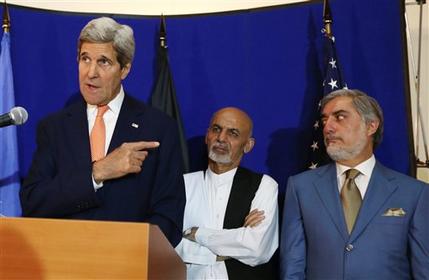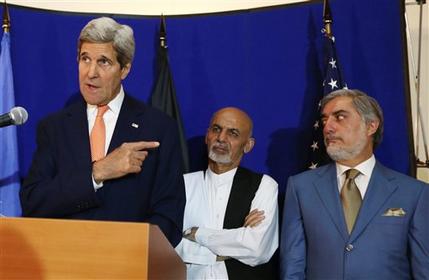 FILE - In this Friday, Aug. 8, 2014 file photo, U.S. Secretary of State John Kerry, left, speaks as Afghan presidential candidates Ashraf Ghani Ahmadzai, center, and Abdullah Abdullah listen during a joint press conference in Kabul, Afghanistan. "Radicals" backing Abdullah could foment postelection violence if he isn't given an equitable share of power, his spokesman warned Saturday, Sept. 6, 2014 ahead of a meeting with his rival aimed at resolving a monthslong election dispute. U.S. Secretary of State John Kerry helped broker an agreement this summer under which all 8 million ballots would be recounted, a process which was concluded Friday. (AP Photo/Rahmat Gul, File)[/caption]
FILE - In this Friday, Aug. 8, 2014 file photo, U.S. Secretary of State John Kerry, left, speaks as Afghan presidential candidates Ashraf Ghani Ahmadzai, center, and Abdullah Abdullah listen during a joint press conference in Kabul, Afghanistan. "Radicals" backing Abdullah could foment postelection violence if he isn't given an equitable share of power, his spokesman warned Saturday, Sept. 6, 2014 ahead of a meeting with his rival aimed at resolving a monthslong election dispute. U.S. Secretary of State John Kerry helped broker an agreement this summer under which all 8 million ballots would be recounted, a process which was concluded Friday. (AP Photo/Rahmat Gul, File)[/caption]KABUL, Afghanistan (AP) -- Abdullah Abdullah, one of two contenders for Afghanistan's presidency, said Monday that he will not accept the expected outcome of the election's second round and that talks with his opponent to form a national unity government are deadlocked.
Abdullah said he believes he won both times that Afghans voted this year - in April and again in a June runoff - and he accused election authorities of giving the win to his opponent, former Finance Minister Ashraf Ghani Ahmadzai.
The country's election commission is expected to announce the second-round results later this week following a weekslong audit process carried out to weed out the many fraudulent ballots cast.
"We were the winners of the election," said Abdullah, who appeared uncomfortable and possibly tired as he spoke behind a wooden podium. "We are the winners of the election based on the real vote of the people."
The U.S. has been pressing Abdullah and Ghani Ahmadzai to form a national unity government, and President Barack Obama spoke with both on Saturday. The two sides have not been able to agree on what powers the newly created position of chief executive would have.
The two met for face-to-face talks earlier Monday but clearly could not reach a deal.
"The political process has reached a deadlock," said Abdullah, who did not say he was pulling out of talks or that the idea or a national unity government was dead.
The threat of violence hangs over the election process. Tuesday is a national holiday here to honor a former militia commander, Ahmad Shah Massoud, a figure who has attained hero status in the country's north. Massoud was killed two days before the Sept. 11, 2001, attacks in the U.S.
Knowing that tensions could run high, Abdullah asked the country for calm on Tuesday and told supporters not to mix their emotions over the election and Massoud.
A spokesman for Abdullah over the weekend said that "radicals" in Abdullah's camp could foment violence if Abdullah is not given a share of power. Abdul Rahim Wardak, the country's former defense minister, said in an interview on Monday he believes violence is possible.
"I think there is the possibility," Wardak said. "There are some countries that want that. Both to our east and west," he said, in apparent references to neighbors Pakistan and Iran.
Kabir Ranjbar, a member of Ghani Ahmadzai's election team, essentially blamed Abdullah for being a poor loser and said he should accept the outcome of the vote given that the audit was aided and observed by the U.N. and the international community.
Abdullah - who placed second in Afghanistan's 2009 vote after what he alleged was massive vote fraud in favor of President Hamid Karzai - did not say what he planned to do next. He said he would make a decision "based on consultations with the people."
The international community had hoped for a smooth transition of power as most foreign forces withdraw by the end of the year. The U.S. wants the next Afghan president to quickly sign a security agreement to allow some 10,000 troops to remain to assist with counterterrorism operations and training Afghan forces.
Karzai, who has been in power since the 2001 U.S.-led invasion that ousted the Taliban, has refused to sign the accord. Both candidates have said they would sign it; one must be sworn in first.
By The Associated Press
The Iran Project is not responsible for the content of quoted articles.











